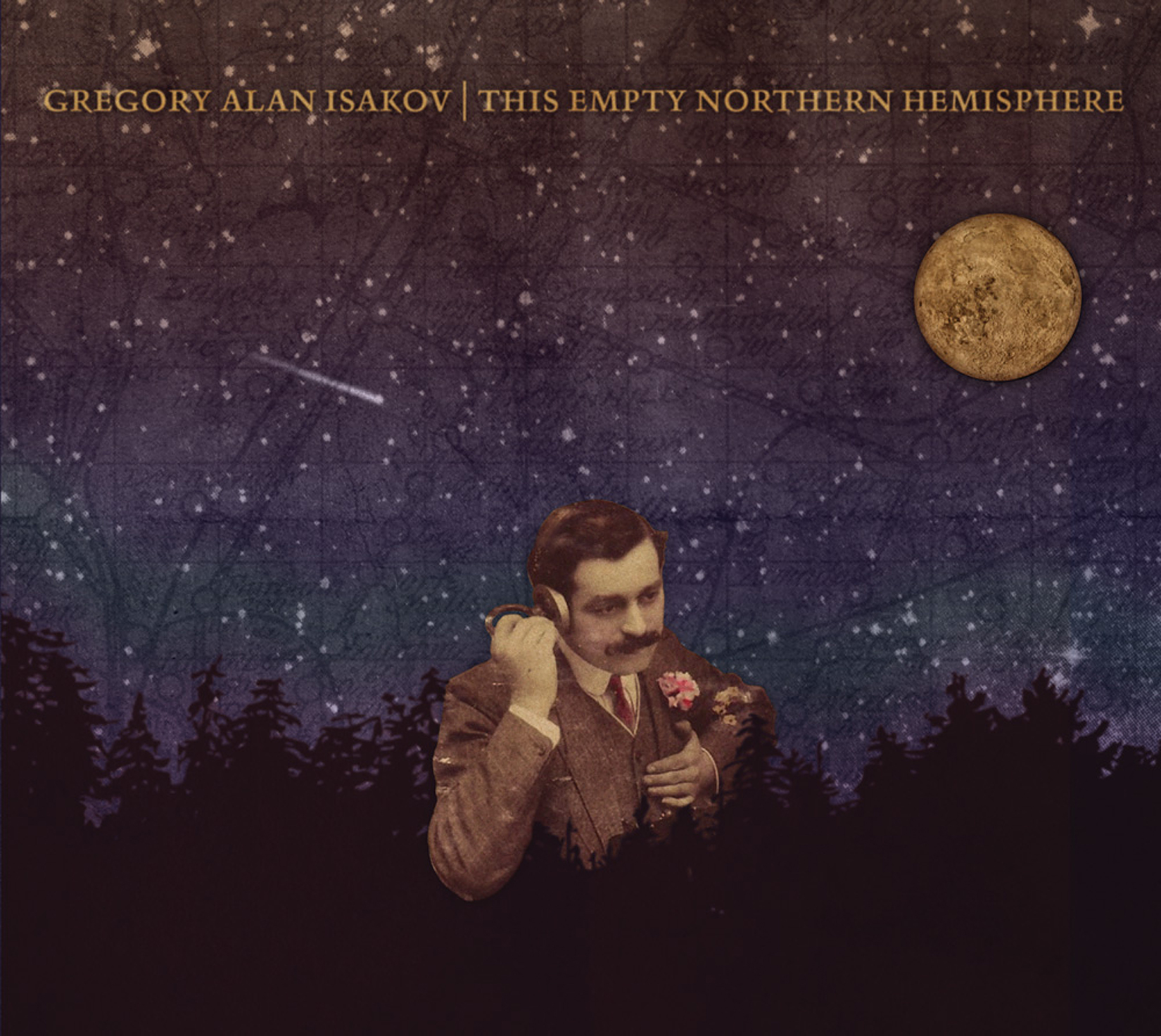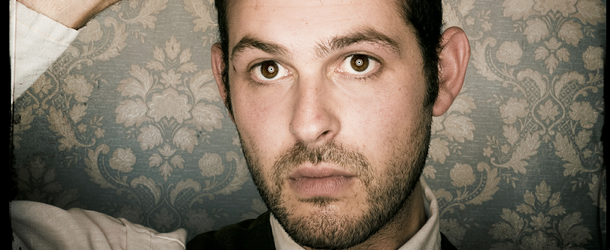[Editor's note: This Q&A previews Gregory Alan Isakov's concert with Classes and Gerardo Meza on Saturday at the Bourbon Theatre. Show starts at 9 p.m., and cover is $8 advance, $10 day of show.]
For years, Gregory Alan Isakov lived on a farm outside of Lyons, Colo. He'd look out his window and wouldn't see anything but a cow pasture. It's an empty vastness that we Nebraskans know all too well, and it's a void Isakov helps to fill with his full-bodied folk songs.
This college-educated horticulturist's songs are something like good-natured farmers themselves, with weathered faces of their own, calloused fingers and a collection of off-to-the-skies looks. Isakov sounds comfortable using both his should-be-a-good-friend voice and a more distant, radio-broadcast tone. Considering his background — and that his latest album is called The Empty Northern Hemisphere — it seems almost fitting that every other word is lost to bad reception at the start of our phone interview.
As he and the band drive through Illinois on their way to St. Louis, we hang up and wait for the bars to show up. Isakov pulls off the road where he finds an oasis in the emptiness, and he answers a few questions about his friend in Sargent, Neb., who gave him his favorite guitar, about watching his garden grow while on tour and where his songs come from. See Isakov in concert Saturday at the Bourbon Theatre with Classes and Gerardo Meza.
Hear Nebraska: Tell me about your favorite instrument, what is its story?
Gregory Alan Isakov: I have a lot of favorites, but I have a Gibson I play a lot from 1967. My friend brought it to Vietnam and back and later gave it to me. I also have this $75 Silvertone I found and never had a case for it. I’ve been writing on it a little lately, but yeah, the Gibson is my standby.
HN: Do you like guitars with a story, with character?
GAI: I do. A lot of older guitars just sound so much better, and a lot of the time they do have a history. I’ve never liked the sound of new guitars for some reason.
HN: I’ve read that you wrote the album That Sea, The Gambler while driving in a truck to and from work on a farm. Tell me how that worked; did you record yourself singing while driving, or did you remember everything?
GAI: I never recorded it. I’d pull over a lot to scribble stuff down every so often. It was about a four- or five-song drive, where I'd just go through those songs in my head and work them out. Most of the songs happened that way.

Where was the farm?
GAI: It’s just outside of Lyons, Colo.
HN: From your website to some of the clothes you wear, it seems you like an older aesthetic rooted in simpler times. A good number of artists today also seem to be pining for an era past. Why do you think that is?
GAI: I don’t know. I’m not sure. I do like to help out with the people who do our artwork and website. But yeah, I don’t know where that comes from.
HN: You say that you don’t know where your songs come from. As you come to know them through recording and live performance, is it like getting to know a person?
GAI: Yeah, I feel like I never really know where they come from, but I feel like when they’re finished, they’re finished. I’m in a different place from where the song starts. It’s like a ride or an adventure. Hopefully, you kind of end up in a different place.
I write a lot of words and a lot doesn’t make it into a song. Some of it does, though. And I heard someone say once that you walk around eating up poetry and one day you just throw up a song. It's a lot like that (laughs).
You have all these experiences, and some of them come out in songs. And some of the songs, I throw away right after I finish them. I never know which ones are the ones that last.
HN: I’d say you have a better idea of the openness of this region than most touring artists. Is there something about the relative emptiness that influences the music written in states like Colorado and Nebraska?
GAI: I do. It does make it into the music. I write a lot on the road. It’s funny the first time I went to California, I had my first record out. I felt funny when I was playing among palm trees. I remember waking up in the place I was staying, and I just felt funny. I remember that being weird. I think that where we are makes in the songs, though.
HN: As a Coloradan, what do you think of your neighbor Nebraska?
GAI: I love Nebraska. My good friend is a rancher up there in Sargent, he’s a great songwriter and the same guy who gave me my Gibson. I’ve driven through there a lot, it feels like home. His name's Bruce Cofler, and I just produced his record: a lot of war songs, cow songs, but really good.
HN: Since you went to college for horticulture, I'm wondering if you have friends tend to your garden while you’re on tour, or do you wait to plant till you get back home?
GAI: My neighbor is sending me pictures of it. We’ve had a super nice spring this year. We didn’t have the normal frost that we do (laughs). You probably know just as well as I do about that.
We were just talking about trying to time our trip to get back when it’s not dark. Let’s try to get there during the day to see how everything's doing.
HN: I have a question about "Dandelion Wine," a metaphor in that song, but first I just want to know what dandelion wine is.
GAI: We used to make it out on the farm. It’s really good; it's fermented, and you take the dandelions and make like a honey wine. It has that quality of a certain place, which kind of came out in that song. People relate to that song because Ray Bradbury wrote a book called Dandelion Wine, but I've never read that actually.
HN: You describe the summer in “Dandelion Wine” and a certain “you” in “Big Black Car” as magazines. Could you unpack those metaphors?
GAI: The first one in "Dandelion" is kind of inspired by sitting in town, in Boulder in the summer. It clears out because everyone leaves town. It becomes quiet, and it feels like a lazy afternoon: the hot air, times going by slow. Then in “Big Black Car” it’s talking about someone who’s fancy and out of reach like a magazine.
HN: All right, I guess that's about it for questions. Since we're a website focused on Nebraskan musicians, though, could you tell me a little more about your friend Bruce?
GAI: Yeah, he just put out a record. My producer and myself produced it, and it’s a great record. (Isakov asks his bandmates) What did Bruce call the record? I think we have it in the van (pause). It’s called The Road Back Home.
HN: Cool, thank you. That should be it then. Do you have anything else to add?
GAI: Oh, just that we’re excited to be back in Nebraska. We haven’t played in Lincoln, so we're looking forward to that. The last time we played in Omaha, that was really fun. We’ve heard great things about Lincoln, so it should be a good time.
Michael Todd is Hear Nebraska's managing editor. He didn't ask Gregory who the unwritable girl was, but she has to be something else, even if she's imaginary. Reach Michael at michaeltodd@hearnebraska.org.




